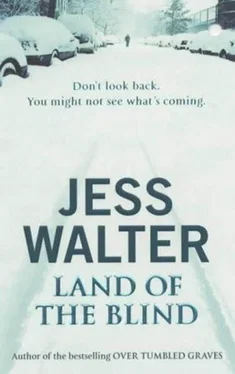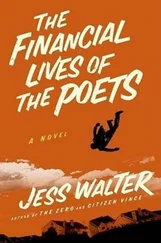Jess Walter - Land Of The Blind
Здесь есть возможность читать онлайн «Jess Walter - Land Of The Blind» весь текст электронной книги совершенно бесплатно (целиком полную версию без сокращений). В некоторых случаях можно слушать аудио, скачать через торрент в формате fb2 и присутствует краткое содержание. Жанр: Детектив, на английском языке. Описание произведения, (предисловие) а так же отзывы посетителей доступны на портале библиотеки ЛибКат.
- Название:Land Of The Blind
- Автор:
- Жанр:
- Год:неизвестен
- ISBN:нет данных
- Рейтинг книги:3 / 5. Голосов: 1
-
Избранное:Добавить в избранное
- Отзывы:
-
Ваша оценка:
- 60
- 1
- 2
- 3
- 4
- 5
Land Of The Blind: краткое содержание, описание и аннотация
Предлагаем к чтению аннотацию, описание, краткое содержание или предисловие (зависит от того, что написал сам автор книги «Land Of The Blind»). Если вы не нашли необходимую информацию о книге — напишите в комментариях, мы постараемся отыскать её.
Land Of The Blind — читать онлайн бесплатно полную книгу (весь текст) целиком
Ниже представлен текст книги, разбитый по страницам. Система сохранения места последней прочитанной страницы, позволяет с удобством читать онлайн бесплатно книгу «Land Of The Blind», без необходимости каждый раз заново искать на чём Вы остановились. Поставьте закладку, и сможете в любой момент перейти на страницу, на которой закончили чтение.
Интервал:
Закладка:
We were in high school. (I skip the horror of junior high with the request that you pause a moment to calculate your own adolescent social pain, multiply it by a thousand, and figure that you are still well short of Eli Boyle's.)
We arrived the way every kid. has ever arrived in high school, taller but no smarter than our elementary selves, swimming in self-consciousness, wishing at once to be universally loved and left alone. I had been fitted for my first glass eye, and hated the way it sat unmoving and creepy in its drooped socket, staring straight ahead while my other eye bounded like a puppy from corner to corner of my skull. I will share a few of my old nicknames, skipping over such obvious names as Cyclops and Patch and Cap'n Hook, names insulting only in their lack of imagination. My favorite – Dead Eye – worked on two levels, in that case to describe both my injury and my free-throw shooting accuracy in basketball. I appreciated Ol' One Ball for its suggestiveness, McGoo for its canny reference to the old goggle-eyed cartoon character, Eye-nstein for its nod to my high grade point average, Glass for its jazzy simplicity, Lefty for its ironic coolness, and Lighthouse for its clean imagery.
As I said, I smoked pot nearly every day in junior high school, but then quit suddenly before my sophomore year of high school. Two things happened that summer: My former friend and supplier Everson moved to Sacramento, and I woke up one morning six feet tall and 175 pounds. With the sudden physical change I decided, the way teenagers decide, that from that moment on I wasn't who I had been. I was now an athlete, in spite of the lung damage caused by three years of pot smoking and the even more daunting disadvantage that I couldn't see a thing out of the left side of my head.
Most coaches, it turns out, will make room for the early-developed on the offensive and defensive lines in football and on the bench in basketball, so I managed to make teams and even start a few games and figure in their outcomes. But I doubt that I distinguished myself in anyone's memory of those games – except once. That moment took place during my senior year, against our hated basketball rival in their packed, raucous gym, when the player ahead of me fouled out early in the fourth quarter and the coach sent me in to kill time, hoping that I would do nothing to ruin our chances.
I didn't. Instead I had my best game ever in those six minutes of that fourth quarter, pulling down a couple of rebounds, hitting a jump shot and two free throws, until we had managed to tie the score with about a minute left, at which point our team got a steal and we began to run up the court for a three-on-one fast break. I had duly filled the left wing and was sprinting toward our basket, looking to the point guard in the center of the court, playing out all sorts of athletic fantasies in my mind, when I strayed slightly out of bounds, bearing down on a cheerleader for the opposing team who was just then kicking up one leg on my vast blindside. There was a gasp and a clap of thunder. I hit her square, with the whole left side of my body. They found her three rows deep, unconscious and bleeding from her nose. The referees blew their whistles and met at center court to see if I could be whistled for a foul for killing a cheerleader. The game stopped, the fans threw programs and Coke cans, and the coach pulled me out for my own safety. We lost by six points. The poor cheerleader, I found out from the newspaper story, had a broken collarbone. And I never scored another point in basketball. That experience, with its long rise and sudden fall, as much as I can trace it, describes the arc of my high school life.
For Eli high school was by no means perfect but was at least bearable, a drastic improvement on the earlier grades. He spent four periods in regular classes and two periods a day in special ed, and he began to outgrow a few of his afflictions, leaving his leg braces and corrective shoes behind. As we got older most of the bullies and dickheads dropped out or were arrested or they spent their days so stoned that they couldn't muster much antagonism, even toward a shit magnet like Eli Boyle. We eventually caught Matt Woodbridge in eighth grade, and left him there when we moved on to ninth. For all I know he's still in eighth grade, forty years old, firing spitwads, looking up "fornication" in the library dictionary, and demanding to fight some kid at lunch. Pete Decker turned out to be too small and skinny to be an effective bully once the rest of us hit puberty. He and I never spoke about what he did to my eye. In fact, we rarely saw each other after that except for the few occasions I saw him walking in the neighborhood and found myself amazed at how small he'd become. He'd ask about some sport I was playing, or which girl I was going out with, and then we'd go our separate ways. He became less and less real to me, and I can't even say that I hated him. It was more like I stopped believing in him. I never had any sort of confrontation with Pete; none of the kids he terrorized ever came back to wreak Hollywood vengeance. Pete just stopped coming to school and eventually faded away, into the big willow tree, into the bad dreams of children.
With the slow extinction of our classic bullies, Eli's torture in high school came from a less dangerous but far more insidious place: the culture of boys and girls and make-out parties, of dances and football games, of going out and going steady and going all the way, of the complex system of bases – first and second and third – a world ruled by sex in which few of the inhabitants were actually having it, but all of us were always daydreaming and working toward it, hoping that something we did or said would lead us to a beanbag chair with a girl in it beneath a black light, fumbling around, hands down tight pants, desperately trying to figure out what to do with the stuff we found in there.
Eli, obviously, was not getting much stuff .
On his best days in tenth and eleventh grade, he was invisible – ignored or tolerated, safely in place at the bottom of this hierarchy. On his worst days he slipped on ice and his books flew across the lawn, or he sneezed and covered his desk in snot, or he wore a black coat that was two-toned by his abiding dandruff. He had been the target of our mockery for so long that by this time the whole thing was starting to feel like nostalgia, and even with his slow improvement a true Eli moment could still be counted on to elicit waves of laughter.
But not from me.
He had saved my life. So as quietly as I could – my own social status being constructed of such fragile material – I helped Eli. I picked up his books and offered him a Kleenex. I wiped the flakes from his coat. I sort of became his sponsor in those days, and if we both understood that a kid like Eli needed a sponsor to live among the athletes and clean complexioned, we were also careful to adhere to the rules of such a relationship and the rigid caste system that meant we didn't talk much at school.
Did I feel my own stock rising during this time? I can't say. I knew I was striving for that thing we called popularity, and I doubt there was a more aggressive and eager-to-please teenager than me. I sought out the best parties and most popular girls and joined and followed and dressed and hung out and made out as if my life depended on it, as if redemption lay in becoming homecoming king. I joined every club and ran for office in every club I joined. I've heard (secondhand, actually, from a mental-health professional by way of my angry ex-wife) that my desire to belong comes from a deep sense of personal fraud – the feeling that I don't fit in – a situation I fought by joining more groups that I didn't fit, thus increasing my feelings of fraud and pushing me to join more groups, causing more fraud, and on and on until I found myself president of both the French and Spanish clubs, without speaking a word of either.
Читать дальшеИнтервал:
Закладка:
Похожие книги на «Land Of The Blind»
Представляем Вашему вниманию похожие книги на «Land Of The Blind» списком для выбора. Мы отобрали схожую по названию и смыслу литературу в надежде предоставить читателям больше вариантов отыскать новые, интересные, ещё непрочитанные произведения.
Обсуждение, отзывы о книге «Land Of The Blind» и просто собственные мнения читателей. Оставьте ваши комментарии, напишите, что Вы думаете о произведении, его смысле или главных героях. Укажите что конкретно понравилось, а что нет, и почему Вы так считаете.











